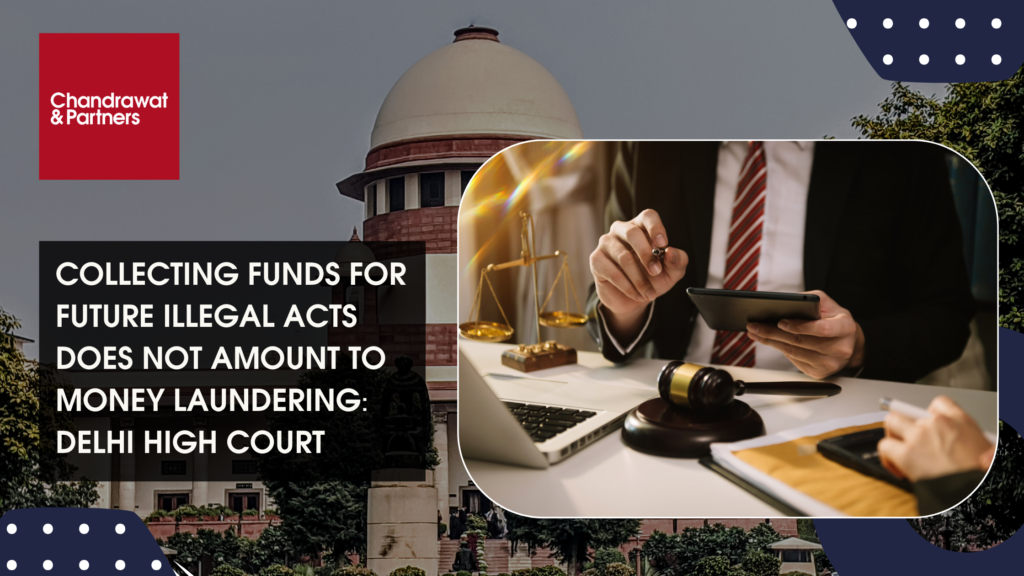Home > Recent Judgements > Collecting Funds For Future Illegal Acts Does Not Amount To Money Laundering: Delhi High Court
DEC 06, 2024

BACKGROUND
In the case of Parvez Ahmed vs Directorate of Enforcement, the Enforcement Case Information Report (“ECIR”) dated 21.09.2022 is based on an National investment agency (“NIA”) First information report (“FIR”) alleging that the Popular Front of India (“PFI”) and its members raised over ₹60 crores, including ₹32.03 crores in cash, through questionable means to finance unlawful activities. The key accused include Petitioner, former President of PFI’s Delhi Unit, General Secretary, Office Secretary. They are alleged to have collected and laundered funds under the guise of donations, with fabricated receipts and untraceable donor details. Investigations revealed that these funds were utilized for unlawful purposes, including inciting violence such as the 2020 Delhi riots. The Directorate of Enforcement (“ED”) has charged the accused with money laundering under Section 3 of the Prevention of Money Laundering Act, 2002 (“PMLA”).
KEY ISSUES
- Whether the collecting of funds for future illegal acts is Money Laundry under section 3 of the PMLA?
- Whether the Delay in trial and long incarceration infringes the right to liberty of an individual?
JUDGEMENT
The Hon’ble Supreme Court decided that the role of the petitioners is that they collected funds and deposited the same to the accountant or PFI‟s account. Hence, in this scenario, prima facie, the dominion and control over the generation of alleged proceeds of crime is not of the petitioners herein. In the present case, the twin conditions of section 45 have been met and prima facie, the offence of money laundering is not made out against the petitioners. The case is at the stage of proceedings under Sections 207/208 for the supply of documents, with charges yet to be framed. The ED’s complaints reveal 185 prosecution witnesses, 456 relied-upon documents, and extensive digital evidence amounting to lakhs of pages, making the trial a lengthy process. The trial is to be conducted jointly with co-accused individuals, a fact undisputed by the ED. Considering the Supreme Court’s guidelines on timelines and the extended duration required to conclude the trial, the petitioners granted bail, subject to specific terms and conditions laid down in the decision.
OBSERVATION
The court observed cases, Vijay Madanlal Choudary v. Union of India (2023) and Pavana Dibbur v. Enforcement Directorate (2023) to distinguish between the commission of a listed offense under the PMLA and the proceeds of crime. According to the clarification, property must be obtained via criminal conduct associated with a scheduled offense in order to qualify as proceeds of crime.
The Enforcement Directorate’s argument that the money raised by the petitioners for the Delhi riots was the profits of crime was dismissed since the money was transferred to the PFI’s account before to the riots and had nothing to do with criminal conduct.
The Court further noted that the PMLA only covers offenses pertaining to the proceeds of crime, not the actual crime, the court further stated, citing the K.A. Najeeb case. It underlined the need for bail in cases when a trial is not likely to be held in a fair amount of time, especially where the accused has completed a significant amount of their term. The court stressed the importance of Article 21 of the Constitution, which safeguards the right to a speedy trial, and denounced the application of strict requirements under statutes like the Unlawful Activities (Prevention) Act (“UAPA”) and PMLA to unjustly refuse bail. In order to ensure the protection of fundamental rights, it was determined that Constitutional Courts must use their authority to stop extended detention without a reasonable possibility of trial.
For more information or queries, please email us at
enquiries@chandrawatpartners.com




